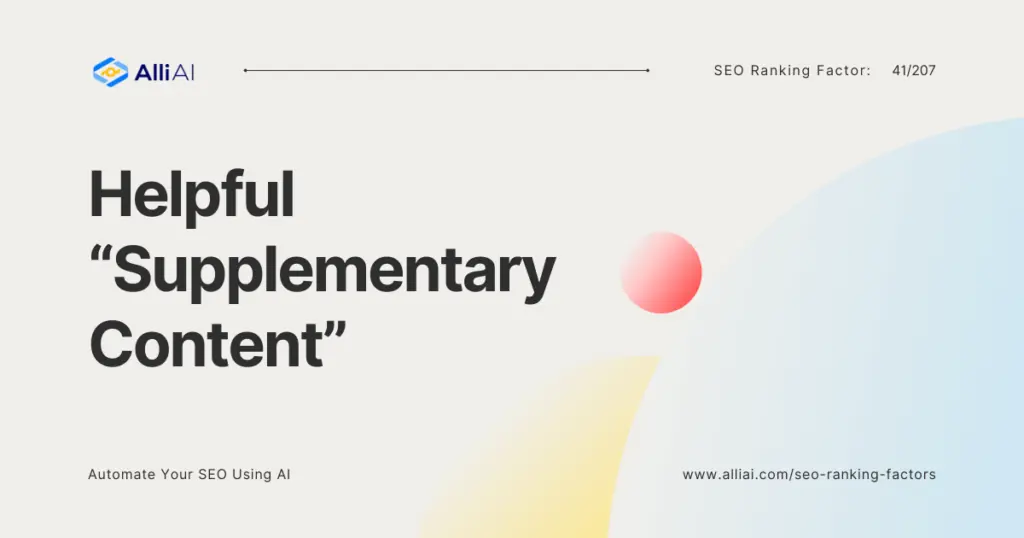Helpful “Supplementary Content”: Elevating Your SEO Game
Supplementary content comes into play as the additional information or resources provided on a webpage that enhances the main content’s value to the user. Picture visiting a cooking blog where the main content revolves around a recipe; supplementary content might include nutritional facts, cooking tips, alternatives for allergy-prone ingredients, or even a step-by-step video guide. It’s like dining at a restaurant where the main dish is complemented by a perfectly paired wine, enhancing the overall meal experience.
Why is “Supplementary Content” Important in SEO?
In the vast, competitive realm of search engine optimization (SEO), providing value beyond the expected is what sets your webpage apart. Google itself highlights the importance of helpful supplementary content in its Search Quality Evaluator Guidelines. This content type enriches the user’s experience and interaction with a site, which in turn signals to search engines that your page provides high value, potentially boosting its rank in search results.
How “Supplementary Content” Affects SEO
The impact of supplementary content on SEO cannot be overstated. Let me break it down with some relevant statistics and insights:
– User Engagement: Websites with compelling supplementary content often see higher engagement rates, including longer time spent on page and lower bounce rates. A study by SEMrush in 2020 found that webpages with high-quality supplementary content had a 30% lower bounce rate compared to those without.
– Content Depth: Google’s algorithms prefer content that provides depth and comprehensiveness. Including supplementary materials that enhance the main content can improve your page’s authority and relevance for targeted keywords. According to a HubSpot study, comprehensive content with useful supplementary materials ranked on average 12% higher than basic content.
– E-A-T Principle: Expertise, Authoritativeness, and Trustworthiness (E-A-T) play a pivotal role in Google’s ranking factors. By adding accurate, helpful supplementary content, you’re showcasing your expertise and contributing to your site’s authority and trustworthiness.
– Backlinks and Social Shares: Quality supplementary content can generate more backlinks and social shares, crucial SEO factors. A BuzzSumo analysis revealed that well-rounded and enhanced content received 22% more backlinks and was shared 15% more on social media platforms.
Through these aspects, it’s clear that integrating useful supplementary content into your webpages can significantly boost your SEO efforts, driving more traffic, and improving your site’s visibility and authority.
FAQ
How do I identify what supplementary content to add to my web pages?
Start by understanding your audience’s needs and questions related to your main content. Tools like Google’s “People also ask” feature or Answer the Public can provide insights into relevant topics. Also, consider what additional resources would enhance the understanding or application of your main content.
Can supplementary content negatively affect my SEO if not done correctly?
Yes, if the supplementary content is not relevant or of low quality, it can distract users or dilute the main content’s value, potentially harming your site’s performance. The key is relevance and enhancement of the user experience.
Does every type of webpage require supplementary content?
While not every page may require supplementary content, any page that aims to provide comprehensive information on a topic can benefit from it. Evaluate the user intent and content goals to decide if supplementary content is necessary.
Conclusion
Incorporating helpful supplementary content within your web pages is akin to providing a full-service experience in a world where the basics no longer suffice. It enriches the user experience, signals quality to search engines, and ultimately sets your content apart in the vast sea of information online. By thoughtfully curating and including supplementary content, you’re not just aiming to meet your audience’s immediate needs – you’re going the extra mile to anticipate and answer their next questions, fostering a deeper connection and driving better SEO results. In the ever-evolving landscape of SEO, those willing to invest in creating comprehensive, value-added experiences through supplementary content are the ones who will thrive.






